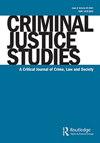Religious bonds, low self-control, and deviant behavior: a fixed-effects approach
IF 1.1
Q3 OPERATIONS RESEARCH & MANAGEMENT SCIENCE
引用次数: 2
Abstract
ABSTRACT Prior scholarship has raised concerns over potential selection effects with religion-deviant behavior relationships. Yet, few studies have attempted to account for selection beyond incorporating control measures in statistical models, and fewer still have done so using adult samples. Using data from the National Study of Adolescent to Adult Health (N = 9,799), this study employs fixed-effects techniques to examine if religious bonds are related to deviant behaviors, and if these relationships are mediated by low self-control. Results from the fixed-effects logistic regressions show that increases in religious bonds are related to decreased odds of both substance use outcomes (binge drinking and marijuana use), but do not relate to non-violent deviance and are related to increased odds of violent deviance. Results further show that low self-control, while a significant predictor of each type of deviant behavior, fails to substantially mediate any of the relationships.宗教纽带、低自制力和越轨行为:固定效应方法
先前的学术研究对宗教与越轨行为之间的潜在选择效应提出了担忧。然而,除了在统计模型中纳入控制措施之外,很少有研究试图解释选择,使用成人样本的研究更少。本研究使用国家青少年到成人健康研究(N = 9,799)的数据,采用固定效应技术来检验宗教关系是否与越轨行为有关,以及这些关系是否由低自我控制介导。固定效应逻辑回归的结果显示,宗教关系的增加与物质使用结果(酗酒和使用大麻)的几率降低有关,但与非暴力偏差无关,而是与暴力偏差的几率增加有关。结果进一步表明,低自制力虽然是每一种越轨行为的重要预测因素,但并不能从本质上调解任何关系。
本文章由计算机程序翻译,如有差异,请以英文原文为准。
求助全文
约1分钟内获得全文
求助全文
来源期刊

CRIMINAL JUSTICE STUDIES
OPERATIONS RESEARCH & MANAGEMENT SCIENCE-
CiteScore
2.80
自引率
5.60%
发文量
17
期刊介绍:
Criminal Justice Studies, a quarterly refereed journal, publishes articles that deal with substantive criminal justice and criminological issues. The journal welcomes all articles that are relevant to the issue of criminal justice, as well as those that may be outside the field but have relevancy to the topic of criminal justice. Articles that cover public administration, issues of public policy, as well as public affairs issues are welcome. The journal also publishes relevant literature reviews, research notes and summary reports of innovative research projects in criminal justice. Qualitative and quantifiable articles are sought mainly from academics and researchers in the field, though articles from professionals will also be considered.
 求助内容:
求助内容: 应助结果提醒方式:
应助结果提醒方式:


